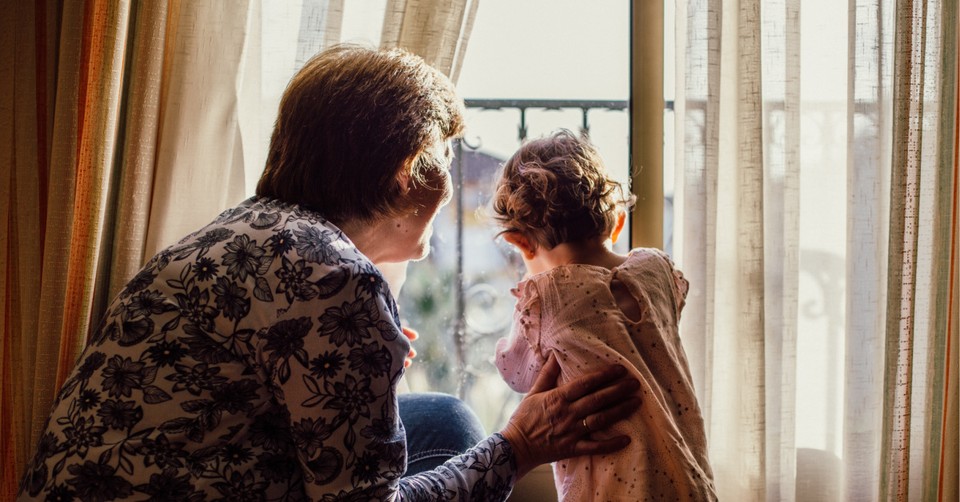5 Things That Hurt Relationships with Grandkids

My children have been blessed to have consistent, weekly, sometimes daily interaction with their grandparents. But unfortunately, this isn't always a gift for some families. Even within our own, we've experienced conflict and tensions that can—if left unresolved—hurt the relationship between grandparent and child.
There's no question that a healthy relationship between grandparents and grandchildren is a wonderful thing. Often, what can be overlooked, is that the bridge between them is the parent. Ripples can begin to affect the peace when that isn't taken into account, and sometimes, all-out fights may ensue.
Let me give an example.
A few years ago, one of my children let a word fly that - in our house - is as generic as exclaiming "darn!" It's not of four-letter word severity, nor was it swearing or taking the Lord's name in vain. However, my parents weren't particularly fond of this very popular and prevalent word. When my child used it, they were reprimanded and schooled on the impropriety of the word. My child came home in tears. My parents were unaware of the effect the incident had on my child. My husband was upset that my parents attempted to "parent" our child about something we have not made a disciplinary issue. The tension became inevitable. By cutting out my husband and myself from the disciplinary lecture for my children, my parents infringed guilt on my children for doing something wrong; they also started to worry that both my husband and I were "naughty" (Since we frequently use the word). While it did get resolved through explanation, compromise, and a willingness on both parties to listen, it could have easily become a wedge.
My parents had to resolve themselves that their daughter and her husband had a different set of standards. My children had to learn that different sets of standards exist and that it doesn't make the grandparents or parents on either side wrong, but rather, just different. They also learned to respect the boundaries in each home and recognized that this particular situation wasn't a sin issue, and they weren't disrespecting God when they used the word.
A three-cord strand binds a family together in these situations: Grandparents, parents, and children. If not recognized, respected, and maneuvered carefully, situations (even minor ones) can create rifts and hurt the relationship we cherish between grandparent and grandchild. So, what are some obvious distinctive things to avoid when trying to protect that relationship and not hurt it for the long haul?
1. Be conscientious of parental authority.
As grandparents, it can be extremely difficult when you disagree with how your children are raising your grandchildren. Whether it's minor or something more major, it can create anxiety and even frustration within you. But challenging parental authority will typically only succeed in alienation. Instead, tread respectfully. Your influence in your grandchildren's lives is far more important than making your point or even correcting your own children. There will more than likely be moments you can have honest, non-volatile conversations with your children. In the meantime, be aware of the guidelines they have set, honor them as much as possible, and spend the time you have investing in your grandchildren's lives.
2. They're not yours.
As hard as it is sometimes, remember your grandchildren are not yours. This means you really have no "rights" to them, as much as it feels that you do. Demanding time with them, insisting that things be arranged to fit your lifestyle, or lecturing your children on how to raise your grandchildren will not inspire a healthy relationship.
Boundaries within this relationship dynamic are important. Recognizing your place as supplemental and not parental will be key to having a healthy relationship and regular visits with your grandchildren.
3. Saying "yes."
Grandparents are known for spoiling their grandkids. As a parent, I both love and despise this. Despise, because it makes me less popular than Grandma. Hee, hee. But truthfully, saying "yes" to the grandkids too often can result in hurting the relationship you have with them. Remember, your grandkids don't need to be bought with things, but rather, your time, your investment of you, and your love. Too many yeses can breed entitlement, and your role as a grandparent will potentially be redefined as the fairy godmother who grants wishes rather than a loving role model.
Being aware of the balance is important. Granted, as a grandparent, you can probably afford to say "yes" more often than a parent. Still, your grandchildren still need to understand and enjoy the security that comes with guidelines, boundaries, and a well-placed "no."
4. Distancing yourself.
Sometimes geography cannot be helped. Miles between you may be a necessary evil that you must live with. However, if you are within easy distance of your grandchildren, you'll want to be aware that distancing yourself from them can be as damaging as expecting to see them whenever and wherever you wish.
What does "distancing" mean? It means not showing interest, including, or inviting your grandchildren into your world. It's important that your own social life or hobbies don't overtake your time to the extent you sacrifice time with the grandkids. Have your kids called and asked you to watch the grandchildren? What's your response? Granted, life has obligations, but have you made your grandchildren a necessary part of your life and time?
Remember, if you don't foster a relationship with them while they're little, as they age, they will likely age out of being interested in time with you.
5. Be a safe place.
Grandparents should be a safe haven for their grandchild. Obvious morals and virtues aside, there are other areas where safety can become a wedge that may hurt the relationship. Consider the bedtime stories you're telling, the shows/cartoons you allow them to watch, the music you expose them to, etc. It's not uncommon that grandparents may have a different grade by which they measure what is and isn't appropriate. Do you also respect those of your grandchildren's parents?
Also, a difficult topic may be aging and your ability to offer a safe environment for your grandchild. Are your driving skills where they need to be for safety? Are you physically capable of caring for the grandchild? While it may be agony to be honest and realize your faculties are diminishing, it may hurt the relationship with your grandchild when you insist that you're capable of various things and your children push back—on behalf of their children—with question/doubt that you are. Be honest with yourself and them. Recognize your limitations, if there are any, in order to preserve the relationship you can have with your grandchild.
There is no perfect equation to grandparenting—the same as I've discovered there's none to parenting either. So much of it seems like common sense, and yet our personalities, convictions, restrictions, and commitments can get in the way of quality relationships.
Your grandchildren will cherish time with you. Your children will cherish your investment in their children. But it does require communication, cooperation, respect, and healthy boundaries. Even in situations with extremely difficult or delicate tensions, first and foremost, your relationship with your grandchild/children needs to be safeguarded. This may mean biting your tongue, hitting your knees in fervent prayer, or compromising.
Remember, you are planting in your grandchildren seeds of legacy. That legacy will live with them long after you have passed on.
Photo credit: ©Pexels/Juan Pablo Serrano Arenas
Jaime Jo Wright is an ECPA and Publisher’s Weekly bestselling author. Her novel “The House on Foster Hill” won the prestigious Christy Award and she continues to publish Gothic thrillers for the inspirational market. Jaime Jo resides in the woods of Wisconsin, lives in dreamland, exists in reality, and invites you to join her adventures at jaimewrightbooks.com and at her podcast madlitmusings.com where she discusses the deeper issues of story and faith with fellow authors.
Originally published January 28, 2025.





